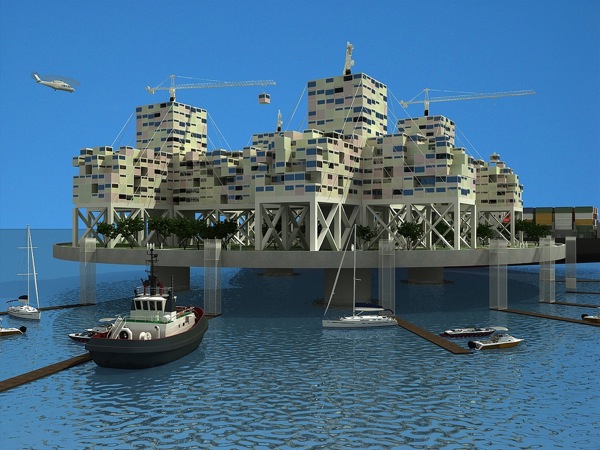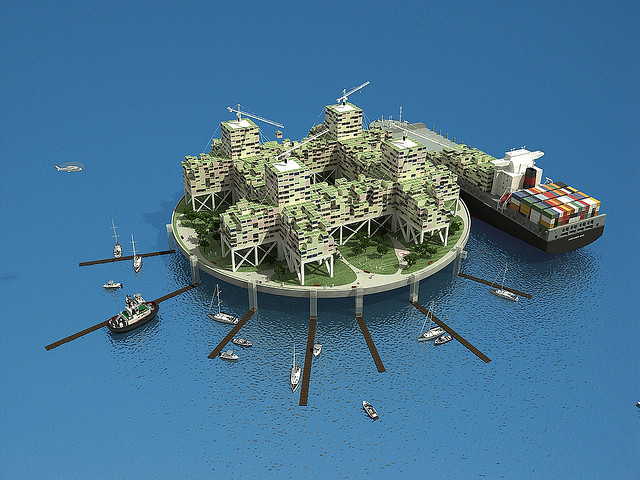In the Fall 2000 issue of PERC Reports, Donald Leal wrote an article called “Homesteading the Oceans.” While Leal was talking about fisheries, seasteading goes much further in the concept of homesteading the high seas, actually suggesting people should move to the ocean and create societies far from land.
Some have already heard of similar stories, such as the one of Roy Bates, a pirate radio broadcaster who tried to create a micronation from a sea fort off the coast of England. But seasteading today has fundamental differences and much broader goals.
The person behind the idea is Patri Friedman, grandson of Milton Friedman, the Nobel prize-winning economist who first exposed two of PERC’s founders, Richard Stoup and John Baden, to free-market ideas back in 1971. The concept arises from a desire to make the world a better place to live in. People constantly disapprove of their own societies: either too conservative or too liberal, either too restrictive or too free. Patri believes that the main reason for this dissatisfaction is the same as the one that distorts the efficiency of market competition: barriers to entry are too high and competitors are ruled out by force, with bad incentives for innovation and good service. It turns out that the ocean is the only place left on Earth where these institutions aren’t yet established, becoming an open framework for experimenting with new forms of societies.
Patri founded the Seasteading Institute in 2008 and received a $500,000 investment from venture capitalist Peter Thiel—who put up the same amount of angel investment funding for Facebook four years earlier. Their work focuses on creating conferences, gathering the community, and organizing information on homesteading the seas, with dozens of articles on engineering, maritime law, business, and environmental sustainability. They’ve also recently received a 235-foot four deck ship which should be a delight for enviropreneurs everywhere, as the Seasteading Institute is looking for proposals for ocean-based businesses on aquaculture, ocean algae farming, and biotech research.
Besides the Seasteading Institute, two Silicon Valley entrepreneurs, Dario Mutabdzija and Max Marty, caught on to the idea and are the first people trying to venture a for-profit company using the concept of seasteading as a background. Their company, Blueseed Co., aims at creating a floating tech community 12 nautical miles from the coast of California, officially in international waters. Blueseed promises to be the “Googleplex of the Sea,” home to hundreds of international start-ups who want to be close to the Silicon Valley and also experience an innovative way of living. Blueseed will embrace entrepreneurs who are restricted from the United States’ resident visa laws while being less than an hour away from the Silicon Valley to do business with easy-to-get tourist visas. That is less than the average commute time in booming São Paulo or Xanghai, and not so far from what Londoner’s experience every day. And regarding the cost of living, the average rent of a Blueseed cabin will be competitive with the soaring housing prices in Silicon Valley.
The reality of “startup cities” is now even closer with Google CEO Larry Page recently endorsing the idea. Page said that technologists “should have some safe places where we can try out some new things and figure out what is the effect on society, what’s the effect on people, without having to deploy kind of into the normal world,” exactly the lean startup concept, but for cities.
Seasteading strikes at the core of what free-market environmentalism is all about: protecting the environment through ownership and creating incentives for people to voluntarily take good care of it in an innovative way. To put it simply, if oceans someday become our home we’ll make more of an effort to care for them.
Anthony Ling is an Architect and Urbanist and writes at RenderingFreedom.com. He designed concept vessels for the Seasteading Institute and for Blueseed, recently becoming a Blueseed ambassador in Brazil.





